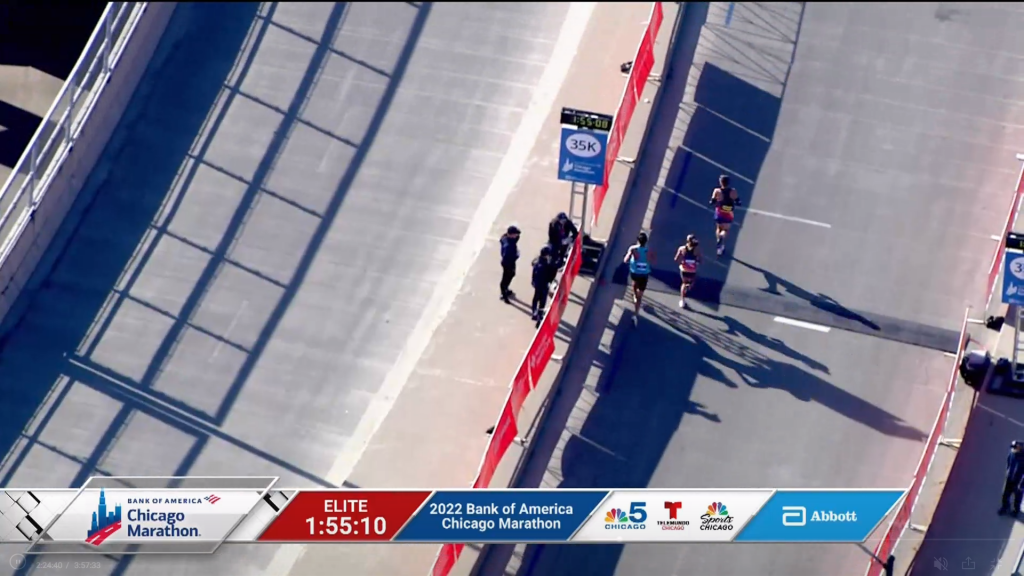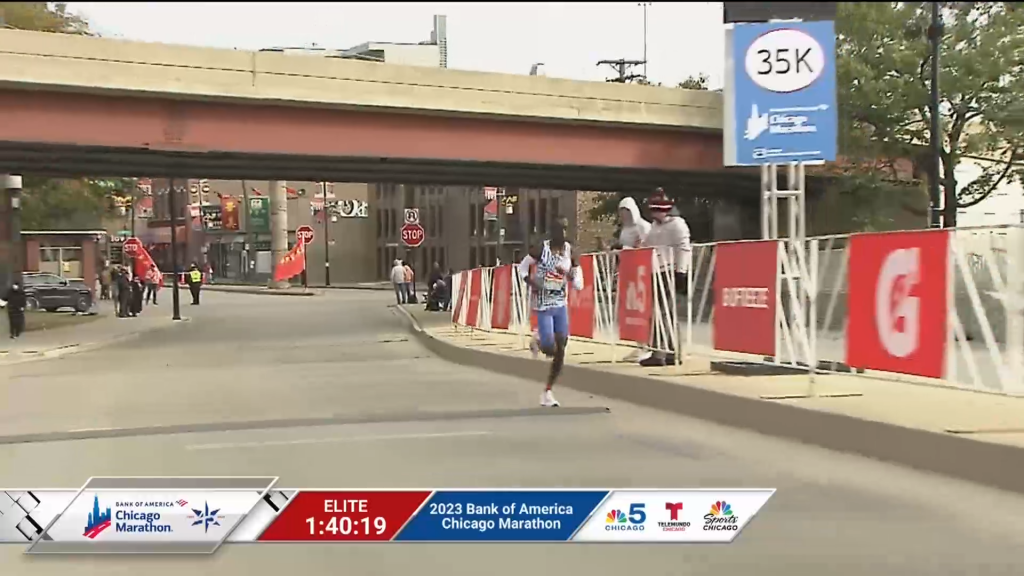Kelvin Kiptum’s 4:18 Mile Split at 2023 Chicago Marathon Was Too Good to Be True
After LetsRun.com showed Chicago Marathon organizers evidence as to why we thought the mile was short, they confirmed there were discrepancies with some mile markers
By Jonathan GaultWhen Kelvin Kiptum ran his 2:00:35 world record at the Bank of America Chicago Marathon on October 8, he did so by running his second half in 59:47 — a split that, until recently, would have been unfathomable for a marathoner. But considering Kiptum closed his win at the London Marathon six months earlier in 59:45, his second-half split in Chicago seemed realistic.
But what about some of the individual mile splits in the second half? Did Kiptum really run a 4:21 19th mile and a 4:18 22nd mile? Those are the two fastest mile splits ever recorded in a major marathon (with the 4:21 being tied with Amos Kipruto‘s 25th mile at 2022 London), much faster than the 4:33.6 pace Kiptum averaged in the second half. It seemed unrealistic, particularly since Kiptum’s last remaining rival, Daniel Mateiko, stayed with him for mile 19.
So LetsRun.com, acting on a tip, did a little investigation (full details below) and quickly concluded that something was amiss. Either that, or Kiptum somehow managed sub-4 mile pace between 30k and 19 miles (30.5775k) and between 35k and 22 miles (35.4056k). We shared our findings with Chicago organizers, who confirmed that the mile markers were misplaced and/or splits were taken incorrectly.
“The mile and kilometer split times available to members of the media…are manual split times entered by spotters on lead vehicles,” wrote Chicago Marathon senior director of communications Alex Sawyer. “The splits are provided to give media a better understanding of the lead group’s pace during the event, with timing mats at every 5K providing the most accurate reading.
“Your note was shared with our operations team who confirmed discrepancies at Mile 19, Mile 22, 37K and Mile 23. The discrepancies were attributed to the misplacement of on-course signage and/or error when inputting times into the system.”
Chicago still has no doubts that Kiptum ran the full marathon distance in his world record.
“As a World Athletics Platinum Label event we work with two independent World Athletics A certified course measurers to conduct an official course measurement,” Sawyer wrote. “The 2023 Bank of America Chicago Marathon course was measured and certified this year.”
Below we share with you the full research we did on the matter.
Mile 19
According to the mile splits provided to media in the press room in Chicago, Kiptum ran his 18th mile in 4:41, his 19th in 4:21, and his 20th in 4:46. The women’s splits told a similar story: winner Sifan Hassan ran mile 18 in 5:10, mile 19 in 4:57, and mile 20 in 5:28. So we were supposed to believe that after running the fastest (Hassan*) or second-fastest mile of the race (Kiptum), both race winners then immediately ran their slowest (Hassan) or second-slowest (Kiptum) miles of the race? All for a relatively flat 19th mile.
In addition, 19 miles is 30,577.5m, which means the difference between the 30k timing mat and the 19-mile marker should be 577.5m. The media timing site listed Kiptum’s 30k split as 1:26:31 and his 19-mile split as 1:27:54. If that were correct, he would have had to have split 1:23 for 577.5m — or 3:51 mile pace! Hassan’s time for the same segment was 1:33 — 4:19 mile pace.
Mile 22
The before-and-after splits for mile 22 are not as jarring but it still proved a fast mile for both Kiptum and Hassan (though it is also slightly downhill). The splits made available to media had Kiptum running mile 21 in 4:24, mile 22 in 4:18, and mile 23 in 4:36. Hassan went 5:17-5:11-5:19.
The more jarring numbers come when you compare it to the 35k split. 22 miles is 35,405.6m, which means the difference between the 35k timing mat and the 22-mile marker should be 405.6m. Kiptum ran that segment in 60 seconds — 3:58 mile pace. Hassan ran it in 1:12 — 4:45 mile pace.
The 35k timing mat was in the same spot as last year — about one meter before a white line on South Wentworth Avenue. The broadcast angles differed from year to year, but you can see the same line on the road from screenshots from 2022 and 2023 below:
In 2022, miles 21-22-23 were fairly consistent: 4:46, 4:50, 4:44 for the leading men, 5:18, 5:18, 5:19 for women’s leader Ruth Chepngetich.
All of this suggests that the 22-mile marker was in a slightly different spot in 2023, which lead to an inaccurate split. Indeed, we reviewed the broadcast to see where the 35k mat and 22-mile marks were in Chicago in 2023 and mapped it out on Google Earth. The difference came to 376m (you can view the segment here). The source that initially tipped LetsRun off to the discrepancy measured the same segment on Google Earth and came up with 372m. Either way, that’s almost 30 meters short — well beyond the margin of error you’d build in by estimating the distance on Google Earth.
One more issue: 23 miles is 37,014.9m, which means the 37k and 23-mile marks should be just 14.9 meters apart. Yet Kiptum’s 37k split was 1:45:46 and his 23-mile split was 1:45:58 — which suggests he took 12 seconds to run 14.9 meters. Again, something is off.
This sometimes happens in marathons. Last fall, Helmut Winter, who along with Sean Hartnett developed the Pace Display System used in recent world records at the Berlin Marathon, pointed out that Yalemzerf Yehualaw‘s 4:43 24th mile at the 2022 London Marathon was likely short. Winter noted that race organizers cannot always put the mile markers out ahead of time on certain spots on the course, such as those near bridges. Since the 22nd mile marker in Chicago is near an underpass, it is possible it could have mistakenly been placed before the underpass rather than after it.
Did you like this article? Well, it’s not the first time we thought a marathon course had problems with its measurement. Read this from 2019: After Re-Measuring the Course, Here’s Definitive Proof That the 2018 Abu Dhabi Marathon Was Short.
Talk about the messed up mile markers at 2023 Chicago on our world-famous messageboard/fan forum:
*The timing site lists the lead women’s 5th-mile split as 4:40, but the split for mile 4 was not taken in the women’s race and only estimated. So mile 5 was almost certainly short.






